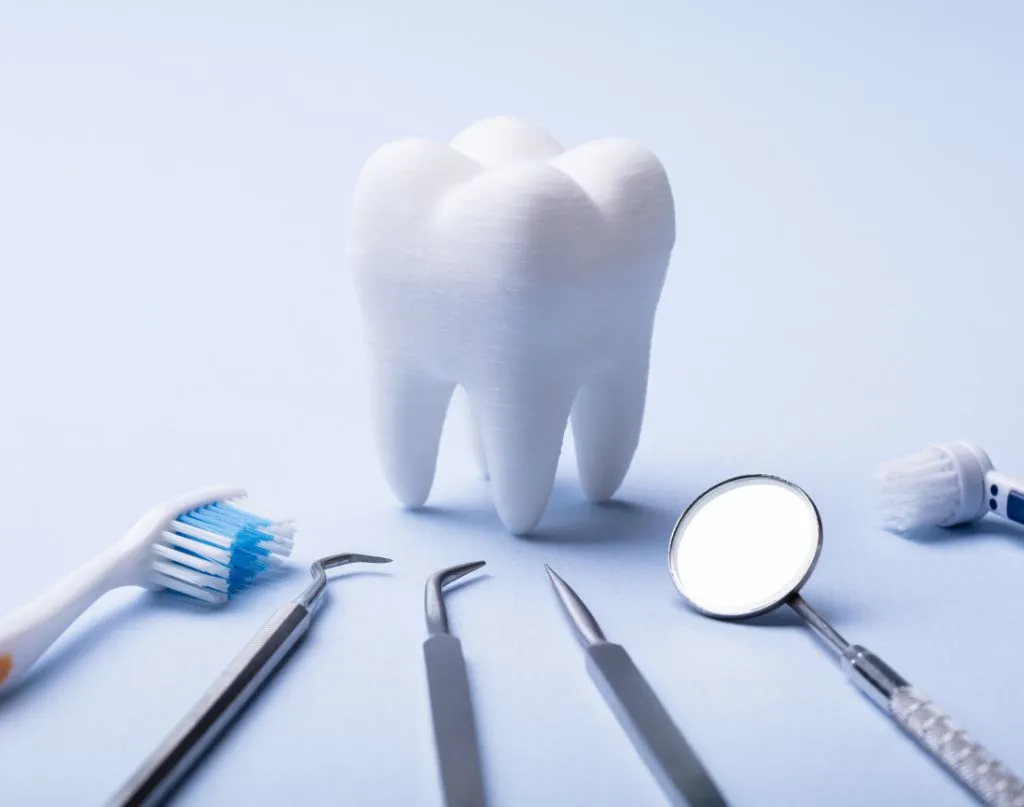The Ultimate Guide To Using A Dental Pick: What They Are and How to Use Them.
Dental hygiene is crucial for maintaining good oral health. Regular brushing and flossing can help prevent tooth decay and gum disease. However, there are certain areas in your mouth that are hard to reach with a toothbrush or floss. This is where dental picks come in handy.
Dental picks, also known as interdental cleaners, are small tools designed to remove food debris and plaque from between teeth and other tight spaces in the mouth. They are typically made of metal or plastic and have a thin, pointed end that can fit between teeth.
Introduction To The Dental Pick
In this guide, we will discuss everything you need to know about dental picks, including the different types available, how to use them properly, and the benefits of incorporating them into your oral hygiene routine.

Types of Dental Picks
There are several types of dental picks available, each with its own unique features and benefits.
Metal Picks: Metal picks are made of stainless steel or other durable materials and are typically reusable. They come in a variety of shapes and sizes, including straight and curved designs. Metal picks are a popular choice for removing stubborn plaque and food debris.
Plastic Picks: Plastic picks are disposable and made of a flexible, lightweight material. They are often more affordable than metal picks and are a good option for people with sensitive gums. Plastic picks are available in a variety of shapes and sizes, including angled designs for hard-to-reach areas.
Floss Picks: Floss picks combine the convenience of a toothpick with the effectiveness of dental floss. They have a pointed end for removing food debris and a flossing head for cleaning between teeth. Floss picks are a good option for people who find traditional flossing difficult or uncomfortable.
Gum Picks: Gum picks are designed to massage and stimulate the gums, promoting healthy circulation and reducing inflammation. They are typically made of rubber or silicone and have a textured surface for gentle massaging. Gum picks are a good option for people with sensitive or bleeding gums.
How to Use A Dental Pick
Using a dental pick is relatively easy, but it’s important to use them properly to avoid damaging your teeth or gums. Here’s how to use a dental pick:
Choose the Right Pick: Select a dental pick that is appropriate for your needs. If you have sensitive gums, choose a soft plastic pick or a gum pick. If you have stubborn plaque or food debris, a metal pick may be more effective.
Position the Pick: Hold the dental pick between your thumb and index finger, with the pointed end facing upwards.
Slide the Pick: Gently slide the pick between your teeth, being careful not to force it. Use a back-and-forth motion to remove any debris or plaque.
Rinse and Repeat: Rinse the dental pick with water after each use and repeat the process for each tooth.
Use Floss: While dental picks can be effective for removing food debris and plaque, they are not a substitute for flossing. It’s important to floss daily to remove any remaining debris and bacteria from between teeth.
Benefits Of Using A Dental Pick
Incorporating dental picks into your oral hygiene routine offers several benefits, including:
Improved Oral Health: Dental picks can help remove stubborn plaque and food debris from between teeth, reducing the risk of tooth decay and gum disease.
Fresher Breath: Food debris can contribute to bad breath. By removing it with a dental pick, you can help keep your breath fresher.
Better Access: Dental picks can reach tight spaces in your mouth that are difficult to reach with a toothbrush or floss, improving your overall oral hygiene.
Convenience: Dental picks are small and easy to carry with you, making it easy to clean your teeth on the go.
Cost-Effective: Dental picks are relatively affordable and reusable, making them a cost-effective option for maintaining good oral health.
Tips for Using A Dental Pick Safely
While dental picks are generally safe to use, it’s important to use them properly to avoid damaging your teeth or gums. Here are some tips for using dental picks safely:
Don’t Force It: Avoid forcing the dental pick between your teeth, as this can damage your gums or cause bleeding. Instead, gently slide the pick back and forth to remove debris.
Be Gentle: Use a light touch when using a dental pick, as too much pressure can damage tooth enamel or cause gum recession.
Don’t Reuse Picks: If you’re using a metal dental pick, be sure to clean it thoroughly after each use to avoid the spread of bacteria. Alternatively, consider using disposable plastic picks.
Use Floss Too: While dental picks can be effective at removing debris, they are not a substitute for flossing. It’s important to floss daily to remove any remaining bacteria and debris.
Dental picks are a useful tool for maintaining good oral health. They can help remove stubborn plaque and food debris from between teeth and other tight spaces in the mouth. There are several types of dental picks available, each with its own unique features and benefits. When using a dental pick, it’s important to use it properly and safely to avoid damaging your teeth or gums.
Incorporating dental picks into your daily oral hygiene routine, along with brushing and flossing, can help improve your overall oral health and reduce the risk of tooth decay and gum disease. So why not give dental picks a try and see how they can benefit your oral health?
Use Dental Probiotics Along With Your Oral Hygiene Routine
Dental probiotics are a relatively new addition to the world of oral health, but they are quickly gaining popularity among dentists and patients alike. Dental probiotics are a type of probiotic that are specifically formulated to promote good oral health by introducing beneficial bacteria to the mouth.
These beneficial bacteria can help to balance the oral microbiome, which is the collection of microorganisms that live in the mouth. A healthy oral microbiome is essential for good oral health, as it helps to protect against harmful bacteria that can cause tooth decay, gum disease, and other oral health issues.
Dental probiotics are available in several different forms, including lozenges, chewing gum, and mouthwash. They are typically made up of strains of bacteria that are naturally found in the mouth, such as Streptococcus salivarius, which is known to promote good oral health.
Using dental probiotics as part of your oral hygiene routine can help to improve the health of your teeth and gums in several ways. Here are just a few of the benefits of using dental probiotics:
Reducing Bad Breath: One of the primary benefits of using dental probiotics is that they can help to reduce bad breath. Bad breath is often caused by the buildup of bacteria in the mouth, and dental probiotics can help to reduce this buildup by introducing beneficial bacteria that can compete with the harmful bacteria.
Preventing Tooth Decay: Dental probiotics can also help to prevent tooth decay by promoting a healthy balance of bacteria in the mouth. This can help to reduce the risk of cavities and other dental issues.
Fighting Gum Disease: Gum disease is a common oral health issue that can lead to tooth loss if left untreated. Dental probiotics can help to fight gum disease by promoting a healthy balance of bacteria in the mouth, reducing inflammation and improving gum health.
Supporting Overall Health: Good oral health is essential for overall health, as poor oral health has been linked to a variety of other health issues. Using dental probiotics can help to improve your overall oral health, which can in turn support your overall health and well-being.
Incorporating dental probiotics into your oral hygiene routine is a simple and effective way to promote good oral health. Talk to your dentist or oral health professional to learn more about dental probiotics and how they can benefit your oral health.














2 Comments
[…] Dental Pick […]
[…] Dental Pick […]
Comments are closed.